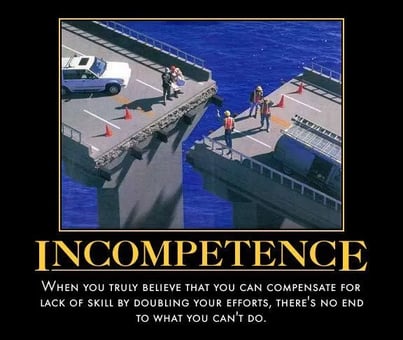Are You Deluded?
The word competence is littered throughout legislation and health and safety documentation as it is such an important component in terms of keeping everyone safe at work. However the word incompetent perhaps is more reflective of work society today. How many of us know of a character similar to our yellow friend Mr Simpson?
 Someone that perhaps overestimates their abilities? Are they a little deluded but somehow walk about under the illusion that they are more superior? Scientists have recognised this phenomenon and it is now labelled the Dunning-Kruger effect. This is not just someone’s ego blinding their weaknesses but in fact being stuck in pocket of incompetence without any skills to recognise their own faults. Without any training, these knowledge gaps will remain and the mistakes will continue to happen. Of course, we don’t want to be labelled as the resident ‘Homer’ in our place of work so what can we do to improve of personal competence? This week’s Toolbox Talk discusses what personal competence is and how we can improve ours.
Someone that perhaps overestimates their abilities? Are they a little deluded but somehow walk about under the illusion that they are more superior? Scientists have recognised this phenomenon and it is now labelled the Dunning-Kruger effect. This is not just someone’s ego blinding their weaknesses but in fact being stuck in pocket of incompetence without any skills to recognise their own faults. Without any training, these knowledge gaps will remain and the mistakes will continue to happen. Of course, we don’t want to be labelled as the resident ‘Homer’ in our place of work so what can we do to improve of personal competence? This week’s Toolbox Talk discusses what personal competence is and how we can improve ours.
Feeling Competent?

Employer or corporate competence is all about the company’s competence as a whole in terms of managing health and safety efficiently and effectively through policies and procedures. This ensures you have a safe place to work with safe access and egress, method statements, risk assessments and the correct tools to do the job. Risk assessments are created bearing in mind the competence of employees and that then feeds into understanding the level of information, instruction, training and supervision needed to be provided. Health and safety competence should be integrated as a fundamental element within the workplace, not as an afterthought.
Getting Personal

So, what is personal competence? Competence is the individual’s ability to recognise the risks and apply the right measures to control the risks. Competence is always relevant to a particular workplace and role; for example, the health and safety knowledge competence to work in an office would be very different to that needed to work on a construction site. Risk assessments play a key part in such control measures and again link to what is relevant for the workplace focusing on the risks that happen most frequently and those that have most serious consequences. Knowing everyone’s limits is imperative when looking at personal competence and creating risk assessments for your workplace. There are five key elements that contribute to someone’s personal competence:
Skills
Knowledge
Attitude
Training
Experience
The combination of all these elements can ensure you keep both yourself, and those around you, safe as well as enabling success in your job through the slick procedures.
From Homer Simpson To Homer (Ancient Greek Legend/Clever Guy)

We are all vulnerable to delusion as we all have gaps in our knowledge and lets me honest, we don’t know what we don’t know (the mind boggles…especially our Mr Simpson characters!) Funnily enough, those that have moderate expertise, have less confidence in their abilities as they know enough to realise that there’s a lot that they still don’t know. The best way to not be that incompetent person is to continue learning which will eliminate those invisible holes in your learning that you didn’t know you had. Don’t get me wrong, sometimes training can be flung at an incompetent person which doesn’t necessarily add up to a competent worker. The learned skills then have to be nurtured, put into practise with supervision, given time to build that experience and allow the skills to bed in as second nature. Training to turn you from the Homer Simpson to the Ancient Greek Intelligence of a different Homer can be in the shape of simply self-studying through reading machine manuals, simple in-house training or demonstration with supervision, formal in-house training or external expert training. Remember that all training should take place within work hours and at no cost to the employee. Training should also be refreshed at regular intervals. Though in-house training will suffice for much development of personal competence, certain areas e.g. driving, chainsaw usage and certain machine work requires further training to be undertaken.
Incompetence To Competence
Investing in developing your incompetence into competences as you will feel so much more job satisfaction and gain respect for the quality of your work from your employer. Your employer will rely on you for your expertise and this may lead to promotions. A competent worker is always a safe worker, protecting not only yourself but those around you.

